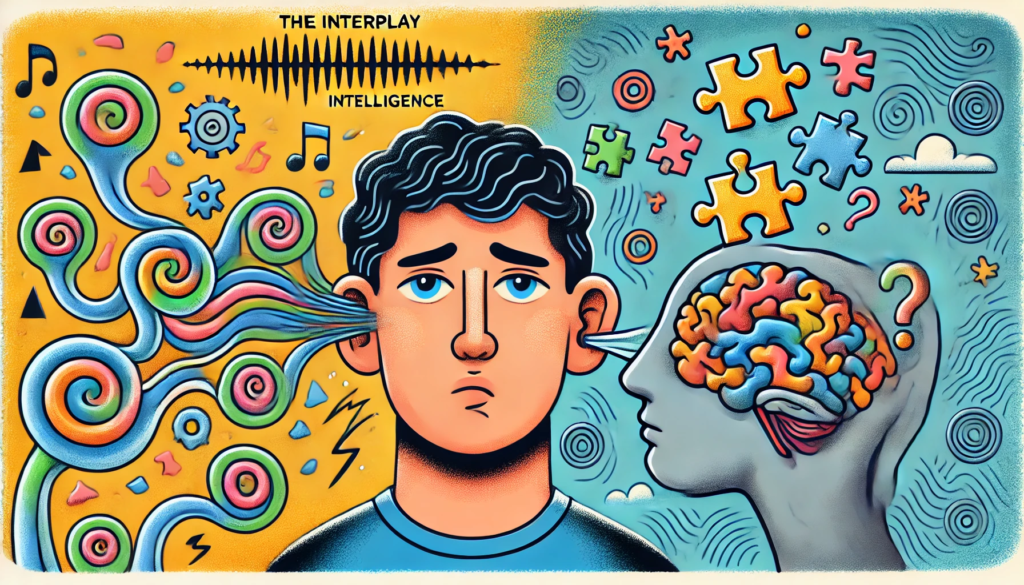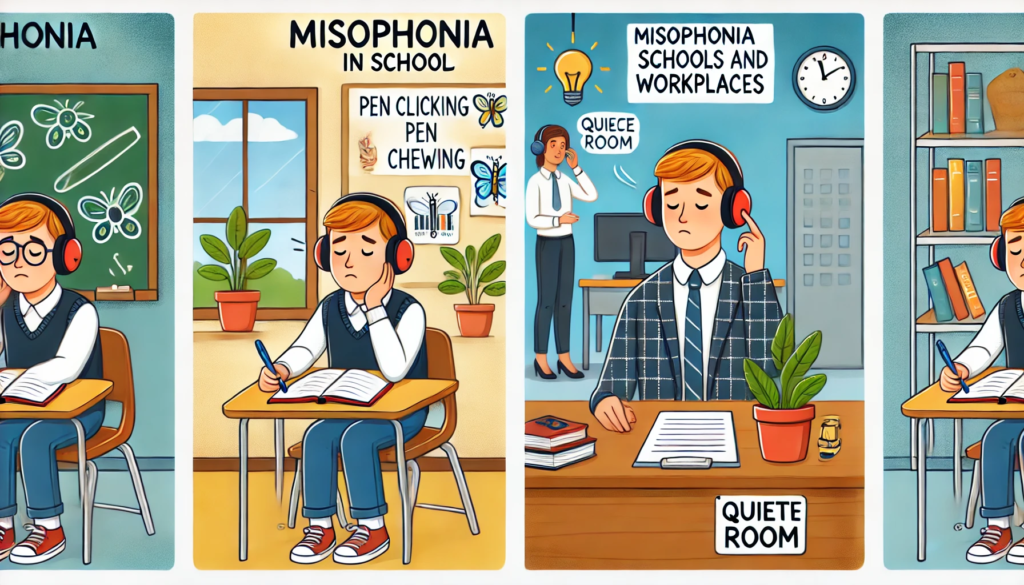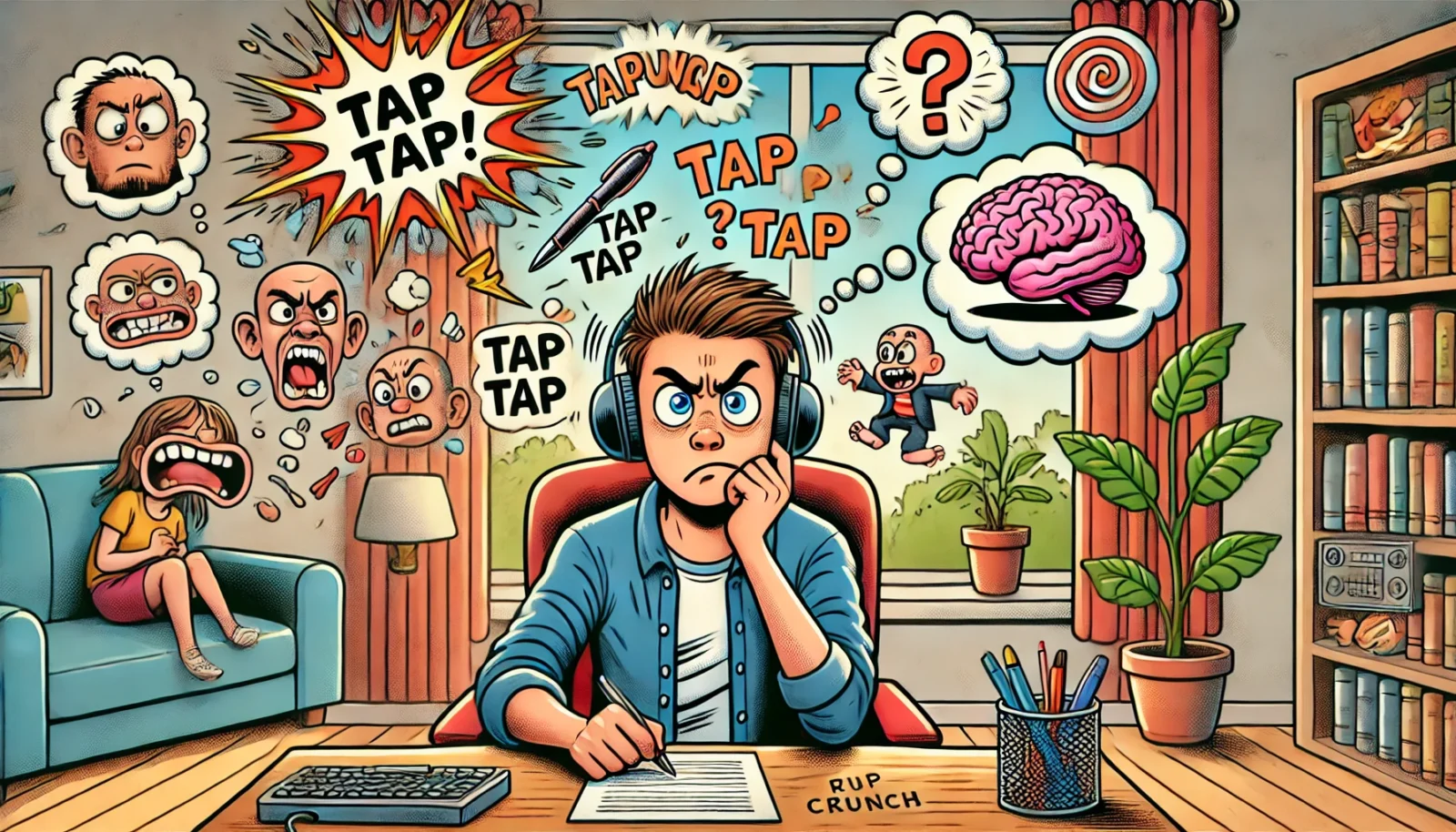It was one of those evenings, sitting quietly in your favorite corner, when the world decided to echo sounds designed to disrupt your peace. Pen tapping, incessant chewing, or the rhythmic drumming of fingers on a desktop can shatter the calm you’ve so carefully constructed. These sounds can feel like intense intrusions, pulling at your patience with an irrational ferocity.
For many, this resonates deeply—a sense of being misunderstood, where noises others dismiss as trivial start a battle in your mind. Yet, what if this sensitivity is more than just a challenge? What if it holds a connection to an intelligence that operates differently, perhaps more keenly aware of the subtleties around us?
This exploration dives into the heart of a fascinating debate—whether this sensory storm many experience is linked to a more extraordinary cognitive processing ability. As we journey through personal experiences and scientific insights, you’ll find stories that may mirror your own, offering comfort and a deeper understanding.
Glancing at the world through this dual lens of misophonia and intelligence, we begin to see the unique tapestry woven by the mind—complex, challenging, and yet astonishingly beautiful.
Introduction to Misophonia and Intelligence
Do you ever feel upset by small noises, like chewing or tapping? This might be because of something called misophonia. Misophonia means hating certain sounds. An affected person may experience strong negative emotional responses, such as distress and anger, triggered by specific sounds. Some people find these sounds very annoying or even painful.
We know that people’s brains work differently. Our brains can do amazing things! This is known as intelligence. Intelligence is about learning, solving problems, and understanding things.
In this blog, we want to discover if there is a connection between misophonia and intelligence. Maybe people who have misophonia think differently or have unique skills. Let’s find out together!
Understanding Misophonia and Trigger Sounds

Misophonia means “hatred of sound.” Some noises can bother people with this condition. Let’s explore what misophonia is all about.
Definition and Symptoms
Misophonia happens when certain sounds make people feel angry or upset. These sounds can be tiny, like chewing or tapping. Clinically significant misophonia distinguishes between varying severities of the condition, identifying individuals whose symptoms significantly interfere with daily functioning. Some people might feel their heart race. They might get sweaty too. These are symptoms of misophonia.
Common Triggers and Responses
Different common trigger sounds can be triggers. Triggers are sounds that cause reactions. Examples include people chewing, clicking pens, or tapping feet. When someone hears a trigger sound, they might feel mad or want to leave the room. They may also feel really uncomfortable.
Prevalence and Demographics
Misophonia can happen to kids and adults. It doesn’t matter if you’re a boy or a girl. Many people all around the world have misophonia. There is no sure way to tell who will have it, but it’s not very rare.
Psychological and Physiological Aspects
Misophonia isn’t all in your head. It affects your emotions and how your body reacts. Some scientists think that the brain responds strongly to specific sounds. This reaction causes strong feelings and body changes.
Understanding misophonia can help us be kind to people who have it. Next time someone gets upset by a sound, remember, it’s not their fault. Let’s help each other feel comfortable.
The Science Behind Misophonia
Misophonia and Mental Health
Misophonia often coexists with other mental health conditions, such as anxiety, depression, and obsessive-compulsive disorder (OCD). Studies have shown that up to 50% of people with misophonia also have a co-occurring mental health condition. This is likely because misophonia can be a significant source of stress and anxiety, exacerbating underlying mental health issues.
Additionally, misophonia can severely impact a person’s quality of life, leading to feelings of isolation, shame, and guilt. People with misophonia may avoid social situations or public places where they might be exposed to trigger sounds, further intensifying feelings of loneliness and disconnection.
Diagnosis and Assessment
Diagnosing misophonia can be challenging, as it is not yet recognized as a distinct medical or psychiatric disorder. However, a diagnosis can be made based on a thorough clinical evaluation, including a physical exam, medical history, and psychological assessment.
The Misophonia Assessment Questionnaire (MAQ) is a commonly used tool for assessing misophonia symptoms. The MAQ asks individuals to rate the severity of their symptoms in response to different trigger sounds, as well as their overall level of distress and impairment.
Intelligence: A Multifaceted Concept

What Is Intelligence?
Intelligence is how we understand and learn new things. It helps us solve problems and make good choices. Some people say intelligence is like a big toolbox filled with different tools. These tools can be used for many things.
Different Types of Intelligence
There are many types of intelligence. Emotional intelligence is when you understand your feelings and others’ too. Logical-mathematical intelligence is suitable for solving math problems and puzzles. Linguistic intelligence helps you use words well and speak clearly. Creative thinking is another type, and individuals with misophonia often exhibit enhanced creativity due to their unique processing of sensory information.
How Do We Measure Intelligence?
People often use tests to measure intelligence. These tests ask questions to see how you think and understand things. But remember, tests do not show everything about a person. A creative person with misophonia might exhibit unique talents that standard tests do not capture. Everyone can be innovative in different ways.
The Interplay Between Misophonia and Intelligence

Misophonia means feeling angry or upset when you hear certain sounds. Some people with misophonia get annoyed by noises like chewing or tapping.
Current research findings show that some scientists believe people with misophonia might be more sensitive to sounds. This means their brains notice sounds more than other people’s brains do. Research indicates that the auditory cortex in individuals with misophonia shows abnormal communication with other brain regions, which may influence creativity and emotional regulation.
Potential links between heightened sensitivity and cognitive abilities suggest that sensitivity to sounds might be linked to thinking skills. People with sensitive hearing might also be good at solving problems or understanding things quickly. The concept of ‘leaky sensory gating’ suggests that individuals with misophonia process a wider range of sensory information, potentially enhancing their creativity by allowing them to make innovative connections between disparate ideas.
We also have anecdotal evidence and case studies from people discussing how misophonia affects them. Some people say their sensitivity helps them notice small details others might miss. Additionally, individuals with misophonia may excel in real-world creative achievement due to their unique sensory processing, enabling them to succeed in creative endeavors.
So, scientists are still studying this topic to learn more about how misophonia and intelligence might be connected. It can help us understand how our brains work.
Misophonia’s Impact on Cognitive Functions and Selective Sound Sensitivity

Do you ever get annoyed when you hear certain sounds? Individuals with misophonia feel negative emotions when they hear certain sounds. That might be misophonia. This is when certain noises, like chewing or tapping, upset you.
Sensory Processing and Attention
Misophonia can cause strong emotional responses, including negative emotions, to specific sounds. These emotional reactions can disrupt your ability to focus and process sensory information effectively.
Effects on Concentration and Productivity
Misophonia can significantly impact your concentration and productivity. Triggering sounds can significantly affect cognitive and social judgments, making it difficult to stay focused and perform tasks efficiently.
Sensory Processing and Attention
People with misophonia have a hard time with sensory processing. Selective sound sensitivity, a key aspect of misophonia, is characterized by intense negative emotional and physiological reactions to specific sound triggers. This means their brains notice sounds more than usual. Because of this, they pay extra attention to noises around them. This can be distracting, especially if they’re trying to focus on something important.
Effects on Concentration and Productivity
When you have misophonia, annoying sounds can make it challenging to concentrate. Eating related sounds are one of the most common triggers that affect concentration and productivity. Imagine trying to do your homework, but you can hear someone tapping their pen. This makes it hard to get work done and to be productive. It can make school and other activities way more challenging.
Potential Benefits: Heightened Perception and Alertness
But, there can be some good things, too. People with misophonia often have heightened perception. However, more severe symptoms can escalate to feelings of rage, emotional distress, anger, panic, and fear, significantly impacting their daily lives. This means they notice details that others might miss. They can be very alert and aware of their surroundings. This keen sense of hearing might help them when extra awareness is a plus.
While misophonia can be challenging to deal with, it also has some unique strengths. If you know someone with misophonia, try to be understanding and patient. Their experience sounds different, and that’s part of what makes them unique.
Treatment Options
Several treatment options are available for misophonia, although more research is needed to determine their effectiveness. Cognitive-behavioral therapy (CBT) is a type of talk therapy that can help individuals with misophonia manage their symptoms and develop coping strategies. Exposure therapy, which involves gradually exposing individuals to trigger sounds in a controlled environment, may also be effective.
Other treatment options include sound therapy, which involves listening to calming sounds or music to help reduce stress and anxiety, and mindfulness-based interventions, which can help individuals develop greater awareness and acceptance of their symptoms.
Coping Strategies and Intelligence Utilization

Misophonia happens when certain sounds upset you a lot. These sounds can be chewing, tapping, or even whispering. Misophonia is not yet classified as a medical or psychiatric disorder under the Diagnostic and Statistical Manual of Mental Disorders (DSM-5). It can make you feel very angry or nervous.
Here are some ways to help manage it:
First, try using headphones or earplugs when a sound bothers you. This can help block unwanted noise.
Next, tell a friend or family member how you feel. Sometimes, it helps to speak out about it. They can support you.
You can also focus on your breathing. When you feel upset, take deep and slow breaths. This can help calm you down.
Now, let’s talk about using your brain power. This means using your intelligence to solve problems.
First, think about what sounds upset you the most. Write them down. This way, you can prepare for when they happen.
Second, come up with a plan. Decide what you will do when you hear these sounds. You can walk away, use your headphones, or focus on something else.
Finally, practice your plan. The more you practice, the better you will get at staying calm.
Using these strategies helps you feel more in control. Working on these techniques can improve your handling of tough situations. Remember, your intelligence is a powerful tool. Use it to help you adapt and solve problems every day.
Misophonia in Schools and Workplaces

Misophonia is a big word that means people get upset with certain sounds. Severe symptoms can lead to extreme emotional responses such as rage, panic, and heightened distress, significantly impacting individuals in school and work environments. This can happen to some kids at school or grown-ups at work. Let’s talk about what this is like and what can help.
Challenges Faced: Negative Emotions
People with misophonia feel uncomfortable with noises like chewing, tapping, or clicking pens. Misophonia is not yet classified as a medical or psychiatric disorder under the Diagnostic and Statistical Manual of Mental Disorders (DSM-5). These sounds can make it hard to focus. At school, this can mean not hearing the teacher well. At work, it might mean missing essential details in meetings.
Importance of Awareness of Clinically Significant Misophonia
Knowing about misophonia helps everyone be more understanding. Awareness of clinically significant misophonia can help identify individuals whose symptoms significantly interfere with daily functioning. Teachers and bosses can learn about it and help make changes so everyone feels okay. This might mean picking quiet spaces or allowing headphones.
Strategies and Support
People with misophonia are often brilliant and creative. With the right support, they may excel in real-world creative achievement, leveraging their unique sensory processing to succeed in creative endeavors. To help them, schools and workplaces can provide quiet rooms. They can also use headphones to block out noises. Finding what works best can help them shine.
By understanding misophonia, we can improve school and work for everyone and help those with misophonia feel happier and do their best.
Future Research Directions
More research is needed to fully understand the causes and consequences of misophonia. Future studies should aim to investigate the neural mechanisms underlying misophonia, as well as the relationship between misophonia and other mental health conditions.
Additionally, more research is needed to develop effective treatments for misophonia. This may involve investigating new therapeutic approaches, such as neurofeedback or transcranial magnetic stimulation (TMS), as well as developing more effective coping strategies and support systems for individuals with misophonia.
Overall, misophonia is a complex and multifaceted condition that requires a comprehensive and multidisciplinary approach to diagnosis and treatment. Further research is needed to fully understand this condition and to develop effective treatments that can improve the lives of individuals with misophonia.
Conclusion

We have talked about many interesting things, including the main topics we learned. We see why studying more is so important, especially for understanding how an affected person experiences strong negative emotional responses to specific sounds.
Learning more helps us find answers. It helps solve problems. We can make things better for everyone.
Let’s keep asking questions and learning. We should support each other. Together, we can make a difference.
References
Here is a list of books, articles, and studies that discuss misophonia and intelligence. Misophonia occurs when certain sounds, like chewing or tapping, really annoy someone. Intelligence means how well someone can understand and solve problems.
“Understanding Misophonia” – This book explains how it affects people.
“The Science of Sound and Emotion”—This article examines how sounds can affect people’s feelings and explains why some noises bother certain people.
“Smart Ways to Cope with Noise” – This study shows how smart people use tricks to handle annoying sounds.
“Brain and Sound: A Connection”—This article explains how the brain reacts to sounds and why misophonia occurs, highlighting the role of the auditory cortex in this condition.
“Growing with Misophonia” – This book shares stories of young people with misophonia and how they deal with it at school.
These resources can help you learn more about misophonia and intelligence. They show how sound and thinking can connect in interesting ways.







Leave a Reply